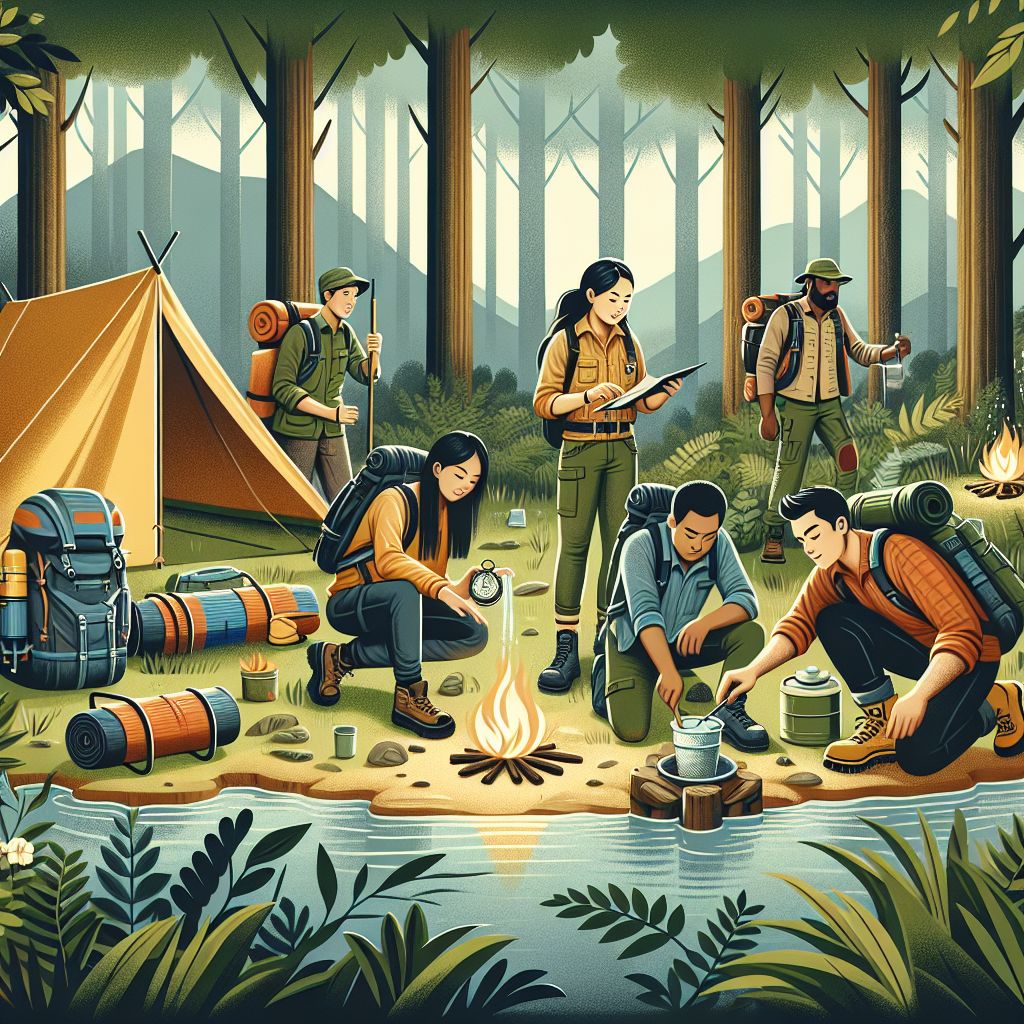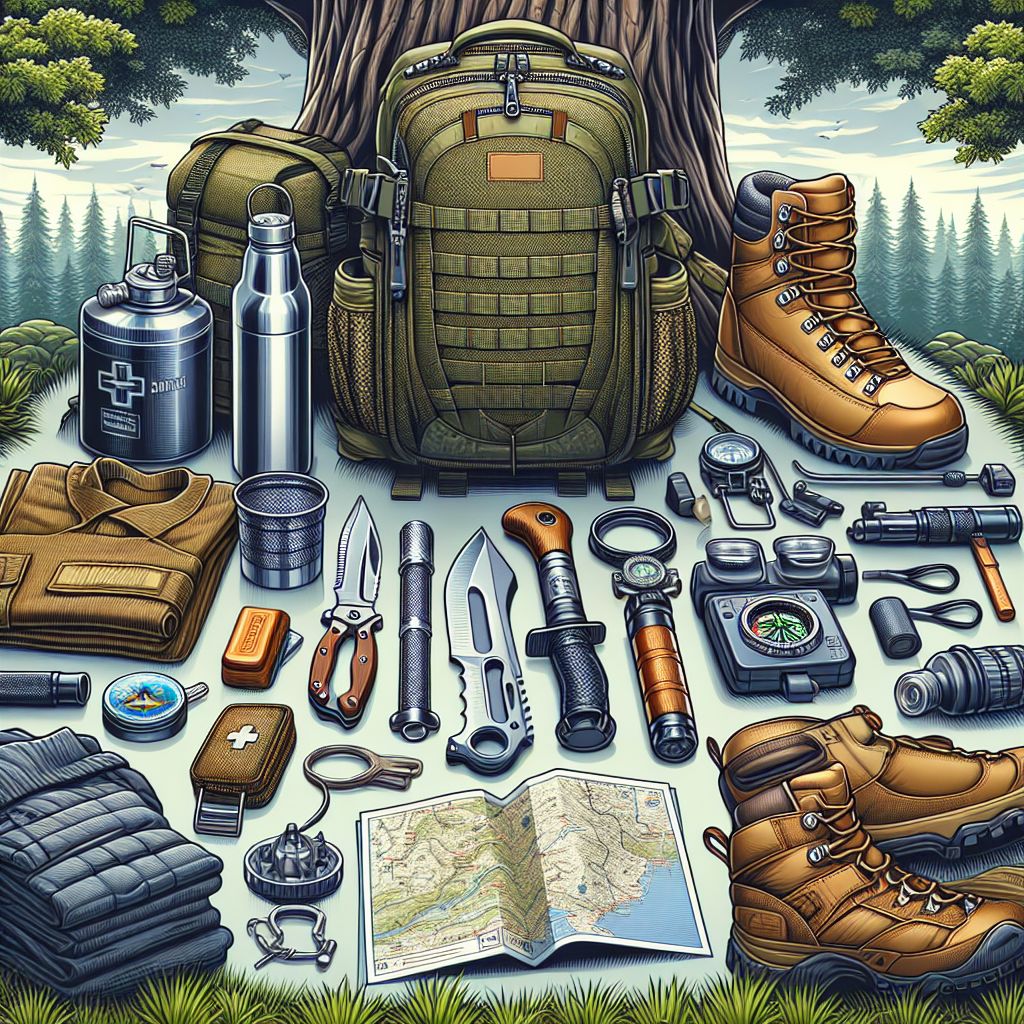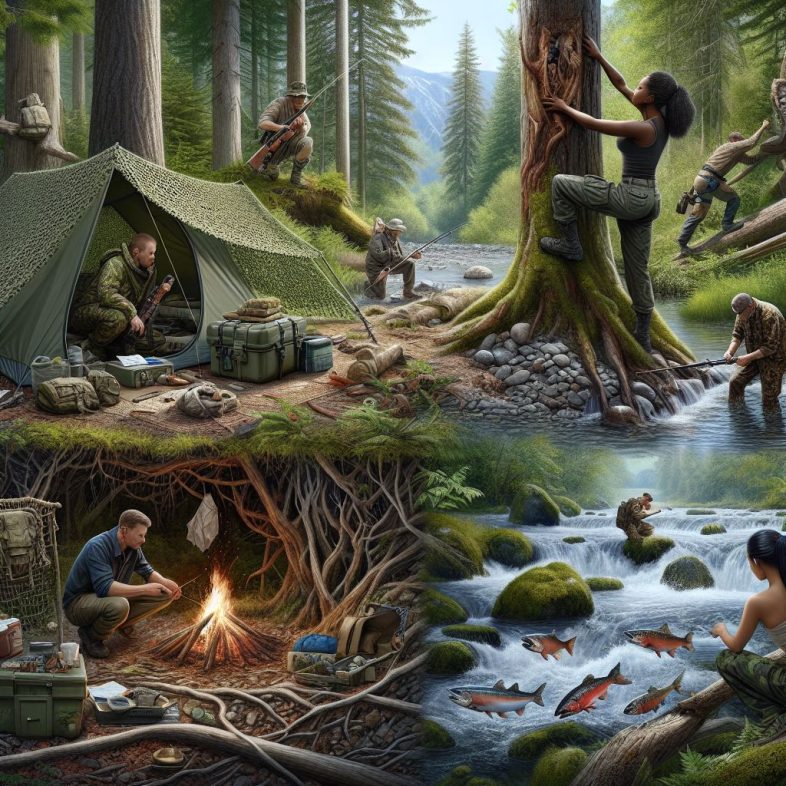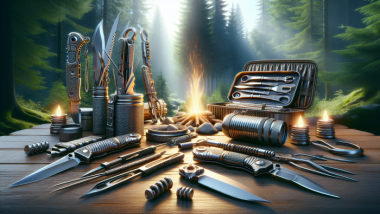Summary of the Article
-
Knowing essential survival skills can be the difference between life and death in the wild.
-
Basic survival skills include building a shelter, finding water, making a fire, and finding food.
-
Advanced skills include navigating without modern tools, purifying water, and signaling for rescue effectively.
-
Practicing survival skills in safe environments regularly can increase confidence and competence.
-
Being mentally prepared is just as important as physical skills in survival situations.

Why Survival Skills Training is Necessary for Every Adventurer
Imagine this: you’re miles away from civilization, the weather suddenly changes, and your GPS is dead. What do you do next? This is when survival skills become useful. But it’s not just about ‘getting by’—it’s about using your knowledge to turn a difficult situation into a manageable one. And that’s exactly what I’m here to help you do.
Why Wilderness Survival Skills Matter
Wilderness survival skills aren’t just for the hardcore adventurer. They’re also for anyone who enjoys the outdoors. They give you the ability to handle emergencies and can even improve your daily life by improving your problem-solving skills and resilience. Plus, there’s a certain sense of satisfaction that comes from knowing you can take care of yourself in the wild.
Survival Training: Your Best Bet Against the Unpredictable Wilderness
The wilderness is a wild and unpredictable beast. It doesn’t play fair, and that’s why preparation is your only defense. Survival training equips you with the skills to handle the unexpected, such as abrupt shifts in weather or losing your bearings. It’s your guide to remaining calm and making intelligent choices when the stakes are high.
Begin With Basic Survival Skills
Locating and Constructing Shelters
As darkness falls or the temperature decreases, having a shelter can be a lifesaver. A well-built shelter can protect you from harsh weather conditions and even help prevent hypothermia. Here’s what you need to keep in mind:
-
Search for natural structures such as rock overhangs or fallen trees to reduce the time you need to build.
-
Use leaves, grass, or pine needles to insulate your shelter to keep your body heat in.
-
Ensure your shelter is large enough for you to lie down in but small enough to preserve your body heat.
The Necessity of Hydration
Water is essential to life—literally. Without it, your chances of survival drastically decrease. The first priority is to find a water source, and then you need to make it safe to drink. Keep in mind, clear water isn’t always clean water. The most reliable way to make it safe is to boil it, but there are also other methods, such as using water purification tablets or filters.
For instance, if you come across a brook, don’t just drink from it immediately. First, use a piece of cloth to remove any big particles. Then, boil the water for at least one minute to get rid of any harmful organisms.
How to Find food
Food is the fuel that keeps your body going, and when you’re out in the wilderness, you’re going to need all the energy you can muster. Edible plants, bugs, and small animals can all be good sources of food. But remember, safety first—if you misidentify a plant or mushroom, it could be deadly.
-
Master the skill of identifying a few common plants and insects that are rich in calories.
-
Know the basics of setting traps and fishing.
-
Always cook your food well to prevent sickness.
Getting lost in the wild is a real danger, but with the right knowledge, you can navigate your way back to safety. It’s important to understand the terrain around you and use it to your advantage.
Finding Your Way Without a Compass
Even if you don’t have a compass or it’s broken, you can still find your way. The sun rises in the east and sets in the west, so you can use this to figure out which way you’re going during the day. At night, look for the North Star. It’s always in the same spot in the northern sky. These are just the basics, but they can save your life.
For instance, if you are lost in the Northern Hemisphere, you can find your way by locating the Big Dipper constellation. Draw a line between the two stars that form the edge of the ‘cup’ and follow that line to the first bright star you see—that’s the North Star.
Moreover, always be aware of your surroundings as you move. Landmarks such as mountains or rivers can help you avoid walking in circles—a frequent error in survival scenarios.
Clean water in the Wilderness
It’s one thing to find water in the wilderness; it’s another to make it safe to drink. Without a way to purify it, you run the risk of getting sick, which can sap your strength when you need it most. Here are some ways to do it:
-
Boiling water is the most surefire way to eliminate pathogens.
-
Solar water disinfection, also known as SODIS, leverages sunlight to enhance water quality.
-
Chemical tablets can make water safe to drink if you adhere to the instructions.
Since hydration is so crucial, always have a means of purifying water with you, such as tablets or a compact filter. And keep in mind, don’t wait until you’re parched to start searching for water—in a survival scenario, it could be too late by then.
How to Signal for Help
When you’re lost or hurt, getting help is the most important thing. You should do everything you can to make it easier for rescuers to find you. A triangle of three fires is a distress signal that’s recognized worldwide. Some other good ways to signal for help include:
-
Signaling aircraft with a mirror or another reflective surface.
-
Whistling with an acorn cap or your hands.
-
Forming a large ‘X’ on the ground with rocks or logs to signal distress.
Practicing these signals even when you’re safe could mean the difference between life and death. It’s easier to remember them in a crisis if you’ve done them before.

Essential Gear
Your survival kit is your best friend, and every piece of gear in it should have a reason for being there. When packing, think less is more—weight and space are valuable commodities.
Must-Have Items for Your Survival Pack
A carefully planned survival pack includes items that meet the basic survival needs: shelter, water, fire, and food. Here’s what you need to pack:
-
Reliable knife or multi-tool.
-
Water cleaning tablets or a small filter.
-
A firestarter, such as waterproof matches or a flint striker.
-
Small, high-calorie food like energy bars or nuts.
These items are the foundation of your survival strategy, so spend money on quality gear that you can trust.
Always Have Items That Can Be Used in Multiple Ways
In addition to the basics, think about things that have more than one use. A bandana, for instance, can be a head cover, a water filter, or a bandage. Duct tape can fix equipment, make a splint, or even assist in starting a fire. When every ounce is important, versatility is crucial.
Training Survival Skills in Safe Settings
It’s said that practice makes perfect, and this is particularly true when it comes to survival skills. Before you find yourself in a real-life emergency situation, it’s best to test your skills in a safe, controlled setting.
Planning Survival Practice Scenarios
Set up practice scenarios that mimic possible survival situations. This could be as basic as camping in your backyard without the comforts of home, or as advanced as a several-day trek with minimal supplies. The aim is to push your limits and learn from every experience.
For example, you could try to start a fire with only one match or build a shelter using only what you find in nature. This will help you become more self-assured and capable.
Learning From Teachers and Wilderness Classes
There is no better way to learn than from people who have done it before. Wilderness survival classes give you the opportunity to learn by doing and to ask questions to people who know what they’re talking about. Try to find classes that teach a wide range of skills and that have different levels of difficulty to match your own level of experience.

Survival is a Mind Game: Train Your Brain
Surviving in the wilderness is not just about physical prowess but also about mental toughness. Stress can impair your judgment and decision-making abilities, so it’s essential to train your mind as well as your body.
Preparing Your Mind for Emergency Scenarios
When it comes to survival, having the right mindset is crucial. It’s important to stay calm, evaluate your surroundings, and make logical choices. Techniques like deep breathing and positive visualization can help you keep stress at bay. The most dangerous thing in a survival situation is panic. For more detailed strategies on maintaining composure in emergency situations, consider reading our guide on improving your survival skills.
How to Manage Stress in Survival Situations
Managing stress is crucial to keeping a clear mind. Regular physical activity, practicing mindfulness, and engaging in hobbies such as solving puzzles can boost your stress management skills. When you’re calm, you’re more likely to recall your training and make decisions that could save your life.
With this information in hand, you’re well-equipped to tackle your next wilderness trip. But remember, knowledge is only powerful when it’s applied. So go out, practice, and always be prepared. For those who want to go even further into wilderness survival skills, consider adding “The Wilderness Survival Bible: Essential Skills for Navigation, Shelter, water, food, Fire, and Safety” to your tool kit. Buy the book and turn the wilderness into a playground of opportunity and adventure.
The Wilderness Survival Bible: Essential Skills for Navigation, Shelter, water, food, Fire, and Safety
When you’re deep in the heart of the wilderness, the right knowledge can be your best ally. That’s why “The Wilderness Survival Bible: Essential Skills for Navigation, Shelter, water, food, Fire, and Safety” is an essential read for anyone who takes the outdoors seriously. This comprehensive guide is packed with practical advice, step-by-step instructions, and real-world scenarios to prepare you for any challenge Mother Nature throws your way.
This book is a comprehensive guide to surviving in the wilderness, covering everything from building a shelter that can withstand any weather to identifying which plants are safe to eat. But it’s more than just a how-to guide—it’s a lifesaver. It’s designed to help you develop the skills you need to not only survive in emergency situations, but also to get the most out of your time in the great outdoors.
Regardless of whether you’re an experienced adventurer or a beginner backpacker, this book is made to provide you with a strong set of skills that will make you feel safe each time you venture into the wilderness. So, if you’re truly committed to learning the craft of wilderness survival, don’t forget to pick up your copy today.
Mastering Wilderness Techniques & Tips: The Ultimate Survival Skills Training
Discover how to survive in the wilderness with this comprehensive guide. This book goes beyond the basics to teach you advanced survival skills for extended periods in the wilderness. Learn how to navigate by the stars, purify water without modern tools, and create signals visible from miles away. With this guide, the wilderness will feel less like a threat and more like a second home.
Common Questions
What Are the Key Wilderness Survival Skills?
-
Finding and purifying water to avoid dehydration
-
Constructing a shelter to protect from weather
-
Starting a fire for warmth, cooking, and signaling
-
Finding and identifying safe food sources
-
Navigation skills to prevent getting lost and find your way back
-
First aid knowledge to handle injuries and illnesses
-
Signaling for help to improve chances of rescue
These skills are the core of wilderness survival and are necessary for anyone going into the outdoors. By becoming proficient in these, you greatly improve your chances of not just surviving, but flourishing in any natural environment. For more detailed guidance, check out this comprehensive wilderness survival guide.
How Frequently Should I Practice Survival Techniques?
Consistent practice is key to maintaining your wilderness survival skills. You should aim to review and practice your skills at least once every few months. The more you practice, the more these skills will become second nature, making it easier to remember and use them in a real emergency.
For instance, you could arrange a monthly weekend hike where you practice finding your way without a GPS or building a shelter using only natural materials. These regular drills will strengthen your abilities and boost your self-assurance in the wilderness.
Keep in mind, the aim is to maintain these abilities at their peak so that if the moment arrives, you’re prepared to respond without delay.
Should You Always Have a Survival Kit When Venturing Outdoors?
Definitely, it’s critical. Even if you’re only planning a quick outing, unpredictable circumstances can occur. Your survival kit should be adapted to the environment you’re venturing into but should always contain the essentials: a way to purify water, start a fire, navigate, signal for help, and administer first aid.
Is it possible to teach yourself wilderness survival skills?
While it is possible to teach yourself many wilderness survival skills using books, online resources, and practice, there is no substitute for hands-on training with experienced instructors. They can provide insights and feedback that you might not be able to get on your own. The best approach is to combine self-study with formal training to get the most well-rounded skill set.
When you’re heading out into the wilderness, remember that the most important thing is to be prepared. Learn as much as you can, practice your skills, and always have a survival kit with you. If you do these things, you’ll be well on your way to being a confident, self-reliant wilderness explorer.


